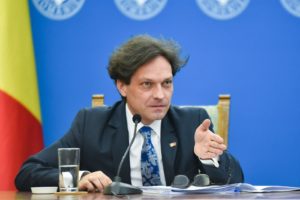As the Romanian presidency of the Council of the European Union approaches, I measure the responsibility and the magnitude of the duties incumbent on us. I am also aware that for some of our partners, Romania is an insufficiently known member that is sometimes trapped in certain clichés. The truth is, as is often the case, much more complex. Before any economic or social approach, there is a cultural reality which is the starting point for better understanding a paradoxical nation.

Romanians are Latin, but Latin who lived surrounded by Slavs. They are Christians, but have spent centuries under Ottoman rule. Romanians have managed to keep their identities at the crossroads of the great empires while undergoing their influences and hosting a significant number of national minorities. Romania is still today a mosaic of Western and Southern European peoples, a country with a large number of religious denominations and which has transformed the concept of tolerance into mainstream practice.
In addition, our traditional belonging to the French-speaking world has been enriched in recent years by a young, largely English-speaking generation; millions of whom already have an individual experience of Europe, having travelled there and often studied and worked. All this is to say that Romania is not only a country “of the East”, but also of the South or the Centre according to the onlooker. For us, multiculturalism is not a recent concept.
On the other hand, we understand some concerns about the risks of levelling and loss of identity in the midst of the globalization whirlwind since we have experienced comparable pressures in the past. We resisted them less by the strength of our economy or our armies than by the preservation of our national culture, of our beliefs and traditions, of our thinkers and artists. A period of communist totalitarianism has left deep wounds in the public consciousness; damaging the courage and social attitude of an entire generation. For Romania, this has been a tough lesson in survival. All of these digested experiences have better prepared us for current community issues.
The relaunched Union, which we call for, must be closer to its citizens. This is one of our priorities and it starts with culture. We need increased cooperation in the cultural field, focusing on the performing and visual arts – closer to our young people – but also by revaluing our immense heritage. This heritage, common in values and rich in its incredible diversity, is simultaneously the noblest business card in Europe and the most detailed of its identity cards. The Europe of tomorrow must first be that of values and creation, of the expectations of our thoughts and the audaciousness of our hearts.
We hope to reach a broad consensus around these goals, even though current debates sometimes reflect a tendency towards polarization. To remedy this, the Romanian approach will be one of moderation and respect for diversity. In the cultural field, more than in any other, creativity and wisdom do not come only from big cities, but often from more remote or modest places. Brancusi or Enesco, Tristan Tzara or Cioran, Panait Istrati or Eugène Ionesco, most of our great intellectuals and artists have often trained in Paris, Vienna or Berlin, but they went there with the sensitivity and traditions of their villages and with a good knowledge of other minority cultures. They have been all the more successful in that they each knew how to make a summation of all these ingredients. As often, the best avant-garde not only contradicts the dominant thought, but draws its roots even more deeply within areas of tradition that have almost been forgotten.
The ambition of the Romanian presidency is first of all to promote and fluidize the relations between the nations of great cultural influence and the least known ones, to facilitate the translation of each one’s hopes and to revive the preservation and the discovery of this linguistic and cultural diversity that is our common wealth. Technological modernization and economic globalization do not only provoke us to react together, but also to tap into our old and deep reservoirs of audacity and creativity. Our Latin impatience makes us dream of getting there in a single leap, but our age-old experience has taught us to take small steps. The latter has the advantage of ensuring a constant pace, consolidating each gain and especially leaving no one behind. In terms of culture, the great advances have not been made only by the flashing revelations of some great geniuses, but especially by the patient yet unstoppable sedimentation of certain values in our collective unconscious. I do not see two speeds there, but rather a more musical kind of approach. In a large orchestra, each instrument, small or large, has an essential contribution to the harmony of the final result.
George Ivașcu
Former Minister of Culture and National Identity

















